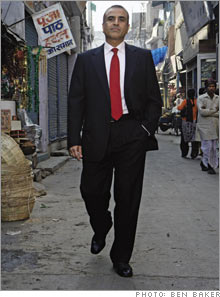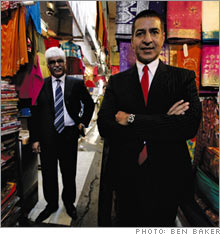Wireless Wonder: India's Sunil MittalIndia's Sunil Mittal has built a mobile-phone empire by turning outsourcing on its head. Now he's plotting a retail revolution with a new partner - Wal-Mart.(Fortune Magazine) -- As the number of his countrymen signing up for mobile-phone service snowballed in 2003, Sunil Mittal, founder and CEO of India's leading wireless company, had a troubling epiphany. Subscribers were doubling every year, putting India on track to overtake China as the world's hottest mobile market. With a 20 percent share, Mittal's firm, Bharti Tele-Ventures, held a slender lead in a crowded field that included rivals backed by deep-pocket Indian conglomerates such as Tata and Reliance (Charts).
To stay out front, Bharti would have to ramp up from three million subscribers to more than 25 million within a few years. But how? The more he pondered, the more Mittal doubted his ability to build out a network fast enough to keep pace with all that growth. "I was meeting with people from Orange, Vodafone (Charts), and T-Mobile," he recalls, sitting in a bungalow on the outskirts of Delhi that serves as Bharti's headquarters. "And I saw that these were huge companies, hugely resourced. And it began to dawn on me: I have to be like them. But could I afford to be like them? We'd need to hire 10,000 people, maybe 20,000, within two years. Did we have the resources to do that? Were we the best company to attract that kind of talent? The answer, clearly, was no." Three years later Bharti Airtel, as the phone company is now known, remains India's No. 1 mobile provider. Its wireless subscriptions have shot past the 30 million mark. For the fiscal year ending this March, the company is expected to report revenue of more than $4 billion, up from $509 million in 2003. Bharti, which lost money every year until 2003, has posted rising profits every year since - analysts expect earnings to exceed $800 million this year - as major rivals bleed red ink. And Bharti's stock is on a tear, rising to more than $14 a share on the Mumbai exchange in late December, a fivefold gain since 2003. With a market capitalization of $26 billion, Bharti has emerged as India's fourth-most-valuable firm, and Mittal one of India's richest men. Networking How did Mittal rise to the challenge of managing breakneck growth? By taking a quintessentially Indian solution - outsourcing - and standing it on its head. Egged on by his CFO and a core of in-house technology specialists, Mittal resolved to give away his network. In 2004 he signed contracts worth $400 million to hand over operation of Bharti's entire phone network to Sweden's Ericsson, Germany's Siemens (Charts) and Finland's Nokia (Charts). The deal means Bharti no longer has to worry about buying and maintaining equipment. Instead it pays the European vendors a fee determined by customer traffic and the quality of service the firms provide. That same year, Mittal signed a ten-year, $750 million contract with IBM (Charts), farming out the bulk of Bharti's information-technology services, including billing, management of customer accounts and even operation of the Bharti intranet. The IBM contract is a revenue-sharing arrangement, but the objective is the same as the deal with the European equipment vendors: freeing Bharti to do what it does best - marketing, devising new services for its customers, and searching for new business opportunities. The Bharti outsourcing model is unique in many ways. In the telecom world, turning your network over to another firm is heresy. "People gasped in horror" when they learned of the plan, says Mittal. "I got calls from around the world saying, 'You've gone nuts, this is the lifeline of your business, it's something you can't afford to lose.'" But Mittal figured he never owned the network in the first place. "If something goes wrong with my switch, there's no way anyone from Bharti can do anything about it. An Ericsson guy is going to have to come and fix it. I don't manufacture it; I can't maintain or upgrade it. So I'm thinking, 'This doesn't really belong to me. Let's just throw it out.'" What's truly innovative about Bharti's approach is that it reverses the stereotype about outsourcing - that it's something Indian firms do for big U.S. and European multinationals. Mittal says he never seriously considered solving his growth problems by partnering with Indian firms. "I can't risk it," he says. "They've never done this kind of thing. They're new, I'm new." |
Sponsors
|


